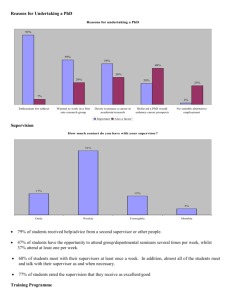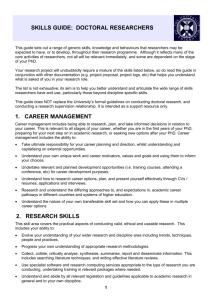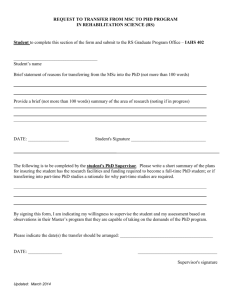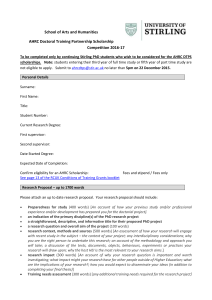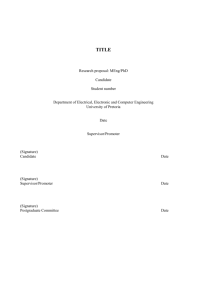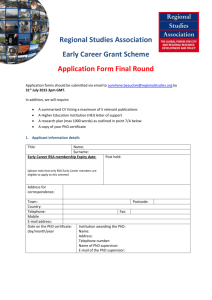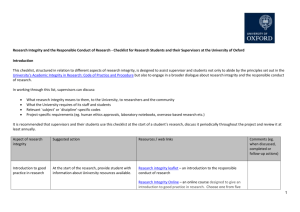UKRIO case study pack
advertisement
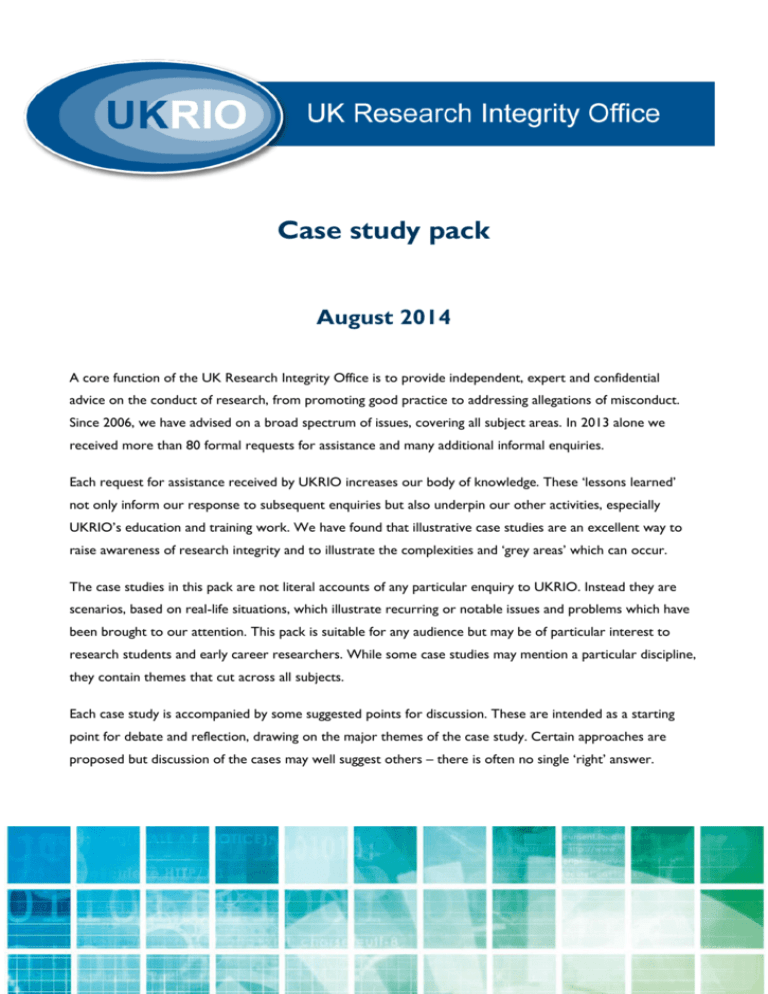
Case study pack August 2014 A core function of the UK Research Integrity Office is to provide independent, expert and confidential advice on the conduct of research, from promoting good practice to addressing allegations of misconduct. Since 2006, we have advised on a broad spectrum of issues, covering all subject areas. In 2013 alone we received more than 80 formal requests for assistance and many additional informal enquiries. Each request for assistance received by UKRIO increases our body of knowledge. These ‘lessons learned’ not only inform our response to subsequent enquiries but also underpin our other activities, especially UKRIO’s education and training work. We have found that illustrative case studies are an excellent way to raise awareness of research integrity and to illustrate the complexities and ‘grey areas’ which can occur. The case studies in this pack are not literal accounts of any particular enquiry to UKRIO. Instead they are scenarios, based on real-life situations, which illustrate recurring or notable issues and problems which have been brought to our attention. This pack is suitable for any audience but may be of particular interest to research students and early career researchers. While some case studies may mention a particular discipline, they contain themes that cut across all subjects. Each case study is accompanied by some suggested points for discussion. These are intended as a starting point for debate and reflection, drawing on the major themes of the case study. Certain approaches are proposed but discussion of the cases may well suggest others – there is often no single ‘right’ answer. UKRIO: Case study pack August 2014 1 Case study 1 Dr Jones and Dr Smith are researchers based in the same department at a UK university. They have been working on a joint research project for several years, publishing a number of articles on their work in peer reviewed journals. The two researchers are now producing a book about their research. The research was conducted under the auspices of their university. The final manuscript was submitted to the publishers a while ago and Dr Jones contacts the firm for an update. He is surprised and very upset when the publishers tell him that the book is to be published with Dr Smith as the sole author. Dr Jones is informed that his role in both the research and the book itself will be acknowledged in the list of contributors to the project, nothing more. The publishers’ decision is based on information supplied by Dr Smith. As far as Dr Jones is concerned, he wrote the book with Dr Smith and should also be credited as an author of the work. Indeed, he is convinced that he and Dr Smith had previously agreed that the book was a joint work and that they would each receive co-authorship. He does not remember having any written record of this agreement or of any discussions regarding authorship. Dr Jones speaks to Dr Smith in an attempt to reach some sort of agreement on the matter but the position remains unchanged. He then tries speaking to the publishers of the book. They say that they have received reassurances from Dr Smith which they accept and they have no plans to change the attribution of authorship. Prior to this dispute, Dr Jones believed that he had a good working relationship with Dr Smith. As well as wanting to resolve the issue of authorship, he is also concerned how his career may be affected by the dispute with Dr Smith. What could Dr Jones do? What ‘evidence’ or other information might shed some light on the matter? How might the situation be resolved? Could anything have been done to prevent this situation from occurring in the first place? Please note that this case study is fictitious. Any similarity to actual persons, organisations or events is coincidental. © UK Research Integrity Office 2014 www.ukrio.org UKRIO: Case study pack August 2014 2 Case study 1 – discussion points What could Dr Jones do? Dr Jones has tried to resolve the matter informally, first with Dr Smith and then with the publisher. Neither approach has been successful. As Dr Jones’ and Dr Smith’s joint research project was conducted under the auspices of the university, it has to meet the university’s standards for good research practice, including authorship. Breaches of these standards can happen because of misconduct in research; they can also happen because of honest mistakes. Having exhausted other options, Dr Jones should contact the university and ask it to look into the matter. It may be able to resolve the matter informally, through talking to the three involved parties, or it may initiate a formal investigation to determine whether the university’s and the publisher’s standards for authorship are being met. Regardless, the university should address the matter objectively, thoroughly and fairly. The university should also reassure Dr Jones that it has processes to help ensure that people raising concerns in good faith do not suffer any detriment. Equally, it should reassure Dr Smith that persons accused of wrongdoing but subsequently exonerated will also suffer no detriment. What information might shed some light on the matter? Any approach to resolving the matter, whether formal or informal, needs to involve interviewing Dr Jones and Dr Smith to get their accounts of the situation. There may also be evidence to indicate who contributed what to the project, for example: draft manuscripts; laboratory, field or other notes; and any correspondence discussing the book or its authorship. The previously-published papers on the research should also be examined, including the roles played by the two researchers and who was listed as an author. The investigator should also talk to the publisher in confidence: how has the publisher made its decision, and did it look into Dr Jones’ concerns properly or simply rely on assurances from Dr Smith? How might the situation be resolved? Disputes over authorship can arise for many reasons: ignorance of what constitutes authorship; misunderstanding of one’s own or another person’s contribution to a project; deliberate attempts to misrepresent a person’s involvement in the work; or, failure to discuss ideas about authorship as the project develops. After gathering more information, the university may be able to negotiate a solution that is acceptable to both Dr Jones and Dr Smith. However, if the evidence suggests that there may have been deliberate misrepresentation of one or the other’s contribution to the work, then it would be sensible for the university to initiate its formal research misconduct procedure. This would allow the university to make a more thorough, formal assessment of the matter. Please note that this case study is fictitious. Any similarity to actual persons, organisations or events is coincidental. © UK Research Integrity Office 2014 www.ukrio.org UKRIO: Case study pack August 2014 3 Could the situation have been prevented? There is no ‘universal’ definition of authorship in academic research. Definitions and practices can vary considerably between disciplines. So researchers should make sure they are familiar with the standards relevant to their work. These would include any overarching standards for their discipline or sub-discipline, the requirements of their university or other employer, guidance from relevant professional bodies and learned societies, organisations such as UKRIO and the Committee on Publication Ethics (COPE) and, in particular, the requirements of the journal or publisher in question. Even when researchers are aware of definitions and standards, applying them can be challenging. This is especially the case in cross-disciplinary or other collaborative research. UKRIO’s view is that it is important for researchers to consider issues relating to publication and authorship, especially the roles of all collaborators and contributors, at an early stage of the design of a project. The researchers should revisit these issues as the project progresses. The roles and contributions of researchers may well change during the time span of the research (sometimes this subject to legal and ethical requirements). What is important is that researchers start thinking early on about how they will approach these issues – they should not leave it until the last stages of the project. Decisions on publication and authorship should be agreed jointly and communicated to all members of the research team. Please note that this case study is fictitious. Any similarity to actual persons, organisations or events is coincidental. © UK Research Integrity Office 2014 www.ukrio.org UKRIO: Case study pack August 2014 4 Case study 2 There are concerns about the research of M, a PhD student in the School of Social Sciences. A significant part of M’s research involved interviewing a number of vulnerable adults about their experiences with the UK social care system. The interviews involved discussion of the reasons why the participants required assistance from the social care system and the nature and outcome of that assistance. The PhD project has been written up and M is about to sit her viva. M identified potential interviewees according to the approved research design, provided them with information on the study and sought their consent to participate. All of the actual interviewees gave their consent to participate and did so in writing. However, it has since been discovered that: The study used a significantly modified consent form rather than that originally approved by the Ethics Committee. This meant that participants gave permission for their data to be used for purposes which the Ethics Committee had not approved. Some of the questions asked in the interviews were significantly different from those originally approved by the Ethics Committee. The changes that have been made to the consent form and the interview questions are substantial, rather than minor or trivial – both documents have been significantly altered. The changes go far beyond any reasonable alterations to the wording, such as from proof-reading or other editing after ethical approval had been received. The university has only begun to look into the matter properly. However, M has already said that her PhD supervisor within the university had confirmed that ethical approval had been given for the project and that the instructions of the Ethics Committee were being followed – i.e. that M was doing nothing wrong. As a PhD student, M had felt it was reasonable to take on trust the information she received from her supervisor. What should be done in response to the concerns about M’s research? Should M be allowed to sit her viva or not? Might there be an alternative solution? Are there any wider issues to consider? Please note that this case study is fictitious. Any similarity to actual persons, organisations or events is coincidental. © UK Research Integrity Office 2014 www.ukrio.org UKRIO: Case study pack August 2014 5 Case study 2 – discussion points What should be done in response to the concerns? The matter needs to be investigated fairly and thoroughly, especially as human participants are involved. At present, all the university has is a brief report of some concerns – which may or may not be true - and a short statement from the student. Other involved parties will need to be interviewed. Documentation should be checked to determine what was the ethical approval for the work and whether this has been followed by M. If not, was this a mistake or deliberate? What was the role of the supervisor, if any? Most importantly, an investigation should assess whether the safety and wellbeing of the participants have been affected. Action should be taken to safeguard the participants as necessary. Suspending the research until the investigation has concluded would be sensible; it could then be reinstated if the concerns were not upheld. The investigation should consider whether participants have been harmed, what actions should be taken if they have been, and how to communicate the situation to them and other involved parties, such as doctors or carers if appropriate. It should be noted that people give their informed consent to participate in research with the understanding that the research has undergone an ethical review process and will be conducted in accordance with that review. Even if the safety, wellbeing or dignity of the participants have not been harmed per se, a breach of ethical approval in human subject research is still a serious matter and undermines their consent. Should M be allowed to sit her viva? The viva should be postponed until the investigation has concluded; possibly until any relevant follow-up actions have taken place. Depending on the outcome of the investigation, M may be able to resubmit her thesis but a serious breach of ethical approval may lead to termination of her PhD study. Are there any wider issues to consider? o M’s statement that her supervisor allegedly approved of, and even encouraged, her actions, raises some questions. If M has acted improperly, whether deliberately or mistake, then the supervisor’s involvement, if any, needs to be investigated. It may well be that M’s statement is incorrect and the supervisor is blameless. Alternatively, the supervisor may have improperly instructed or advised their student. If so, was this an isolated incident? Or might they have acted in the same way with M on other occasions or with other students also? Please note that this case study is fictitious. Any similarity to actual persons, organisations or events is coincidental. © UK Research Integrity Office 2014 www.ukrio.org UKRIO: Case study pack August 2014 o 6 This scenario can be used as a starting point for reflection on the working relationship between PhD student and supervisor in general. The role of a supervisor is to support, encourage, guide and advise; students must not be ‘spoon fed’. Equally, PhD students are expected and encouraged to work and think independently, while still accepting guidance. How straightforward is it to communicate and address responsibilities, needs, expectations and ways of working? How can problems in the working relationship be prevented or addressed? If a PhD student feels that they have been instructed incorrectly by a supervisor, what actions can they take? If a supervisor feels that they are being blamed unfairly for their student’s conduct, what should they do? o How well do researchers, especially research students and early career researchers, know your institution’s system for ethical review? What does it say about making substantial amendments once a study has started? Are researchers aware of what they should do and why failure to do this would be unethical? How straightforward is the process and could it be made clearer? What sources of advice are publicised to researchers dealing with these issues? Please note that this case study is fictitious. Any similarity to actual persons, organisations or events is coincidental. © UK Research Integrity Office 2014 www.ukrio.org UKRIO: Case study pack August 2014 7 Case study 3 Two research assistants in a medical school need some advice. They have been junior members of a research team in the school for almost two years, working on a fixed term contract that expires in a few months. The research team in question is led by a professor in the same school and has been working on a single project. The project has recently been written up and is about to be published. The research assistants tell you that they have carried out a variety of duties on the project, including providing technical assistance, doing literature searches, helping gather and organise primary data, preparing data for publication and supporting various networks and events. Neither research assistant expected to be listed as an author in the published paper but both thought that their contribution to the project would be acknowledged in the article. However, the professor leading the research team has recently told them that they will not be listed in the paper’s acknowledgments section. The research assistants tell you that they are confused and upset by this. According to them, they challenged the professor’s decision but were told, ‘research assistants are employed to work on research projects. We don’t list people in acknowledgements sections for simply doing what they are employed to do.’ The researchers ask for your views on whether the professor’s decision was correct. They stress that they are not seeking to be listed as authors on the paper but would like their contribution to the research to be acknowledged. What should be done in response to the concerns? If what the research assistants say is true, do you agree with the professor’s decision and the reason for it? Are there any other issues to consider? Please note that this case study is fictitious. Any similarity to actual persons, organisations or events is coincidental. © UK Research Integrity Office 2014 www.ukrio.org UKRIO: Case study pack August 2014 Case study 3 – discussion points What should be done in response to the concerns? The university would need to take action to look into the research assistants’ concerns and they should be encouraged to report the matter to the relevant person in the institution. The university might initiate an informal process or examine the matter formally under the university’s research misconduct procedure. Any enquiry should be fair, thorough and objective, and conducted in a timely and transparent manner. Gathering evidence of what contribution the research assistants and the other members of the team made to the project will be crucial. Guidance on publication practices from the university and the relevant journal would also be relevant – are those standards being met? What about the professor’s decision? There are no universal standards for authorship: norms vary between disciplines. In health and biomedicine, various bodies – such as the International Committee of Medical Journal Editors (ICMJE) - have set out criteria for authorship and these have been adopted by many medical journals. ICMJE guidelines state that contributors to a research project who do not fulfil criteria for authorship ‘…should not be listed as authors, but they should be acknowledged.’ This is not dependent on whether they were ‘employed to work on research projects’ or not, and applies to a research assistant as much as to a professor. Indeed, a professor is normally employed to conduct research, weakening the argument of the professor in question… Are there any other issues to consider? o Would the research assistants’ contribution be acknowledged differently – or at all – in another discipline? o This dispute may have arisen because of ignorance of good practice in authorship and of the ‘grey areas’ which can arise. The school may wish to conduct awareness-raising activities and training on these issues. How could the school make the issues of authorship interesting and relevant to its researchers? Would different approaches be needed for students and early career researchers, and for more senior staff? If so, what approaches could be used? o How might this situation impact on the working relationships of the research team? Assuming the same team was going to continue with future projects, what could be done to help ensure the involved parties work together? Or should the issue be left up to the individuals involved? Please note that this case study is fictitious. Any similarity to actual persons, organisations or events is coincidental. © UK Research Integrity Office 2014 www.ukrio.org 8 UKRIO: Case study pack August 2014 Case study 4 You are a PhD student who has recently submitted their thesis, though you have yet to sit your viva. Feeling a bit nervous about what is to come, you talk to a student on your PhD course who will also be sitting their viva soon. During the conversation, he tells you that he did not collect all of the data for his thesis himself; instead, he paid some other researchers to gather the data for him. He says that these researchers did not help with the research design, analysing the data, or with writing up the thesis – he did all of those things himself. He also says that he is not very worried about what the external examiner will think of his thesis, as the external examiner has worked with his supervisor on a number of research projects. What actions do you take? Is it acceptable for a PhD student to pay others to collect data for their PhD? Is it acceptable for an external examiner to assess the PhD thesis when they have previously worked with the student’s supervisor? Please note that this case study is fictitious. Any similarity to actual persons, organisations or events is coincidental. © UK Research Integrity Office 2014 www.ukrio.org 9 UKRIO: Case study pack August 2014 10 Case study 4 – discussion points What actions do you take? It is not a student’s job to investigate possible research misconduct. Any concerns should be reported to your supervisor or to the person responsible for research integrity at your institution. Your fellow student’s remarks may have been serious; however he could have been joking or exaggerating. Is it acceptable for a PhD student to pay others to collect data for their PhD? When examining a PhD thesis, examiners look for original contribution to knowledge, demonstration of broader knowledge in the field of study and an ability to sustain an argument (thesis) in one's own words. Depending on the discipline and project in question, it may be acceptable - or even sensible - for others to assist with data collection. What is essential is transparency in how data was collected and analysed. Fabrication, plagiarism and other misconduct are wholly unacceptable. PhD supervisors should ensure that a student has carried out the work they claim to have done and has contributed enough to 'originality' and 'argument' to warrantably permit them to go forward for assessment. Is it acceptable for an external examiner to assess the PhD thesis when they have previously worked with the student’s supervisor? External examiners of PhDs should ideally have no connections with supervisors. However, in a specialised field the pool of available candidates may be very small and therefore connections cannot be avoided. It is vital that any conflicts of interest are declared and addressed appropriately. University regulations and guidance for the conduct and examination of research degrees must be followed. External examiners must carry out their duties in an honest, rigorous and objective manner. Please note that this case study is fictitious. Any similarity to actual persons, organisations or events is coincidental. © UK Research Integrity Office 2014 www.ukrio.org UKRIO: Case study pack August 2014 Case study 5 A colleague tells you about a fascinating new technique that could be really useful for your research. When you ask for more details, you discover that the colleague read about the technique in a paper she is reviewing for a prestigious journal with a 12-month delay between acceptance and publication. She tells you that she plans to submit her reviewer’s report to the journal next week and will recommend accepting the paper but won’t know what the other reviewers recommend. Your colleague does not know who the authors of the paper are. What can you do? What ethical issues does this scenario raise? Please note that this case study is fictitious. Any similarity to actual persons, organisations or events is coincidental. Used with permission of Dr Elizabeth Wager, Sideview. 11 UKRIO: Case study pack August 2014 12 Case study 5 – suggested issues for discussion What can you do? Peer review is a confidential process. The reviewer should not have discussed the paper with you and they certainly should not share it with you. It would be hard for them to claim that they did not know this, especially as journals set out clear requirements for their reviewers: ‘The review process is strictly confidential and should be treated as such by reviewers. As the author may have chosen to exclude some people from this process, no one who is not directly involved with the manuscript (including colleagues and other experts in the field) should be consulted by the reviewer unless such consultations have first been discussed with the Academic Editor. Reviewers must not take any confidential information they have gained in the review process and use it before the paper is published. Even after publication, unless they have the permission of the authors to use other information, reviewers may only use publicly published data (i.e. the contents of the published article) and not information from any earlier drafts.’ [PLOS ONE Guidelines for Reviewers: Confidentiality. Available from: http://www.plosone.org/static/reviewerGuidelines#confidentiality (accessed August 2014)] If you or the reviewer approaches the journal and asks who wrote the paper and whether you could see it, this would obviously put the reviewer in a difficult position as they should not have discussed it with you. You could ask the journal anyway but it is likely to refuse a request to identify the authors or put you in touch with them. You could check whether anything about the technique is already in the public domain. For example, has it been presented in a conference abstract, is there a patent for it, or can you find anything about in online? What ethical issues does this scenario raise? o The confidentiality requirements of peer review exist not only to help ensure the integrity of the process. They also exist to ensure a ‘level playing field’ for researchers, so everyone has the opportunity to access to the paper at the same time. Breaching confidentiality to make use of the research could be described as ‘insider dealing’ – improper use of privileged information to gain an unfair advantage. o How would you respond to a researcher in this scenario who felt it would be justified to make use of the paper: ‘But I’m developing a treatment for a serious illness [or undertaking similarly important research in another discipline] and the new technique could potentially knock 6 months off the development Please note that this case study is fictitious. Any similarity to actual persons, organisations or events is coincidental. Used with permission of Dr Elizabeth Wager, Sideview. UKRIO: Case study pack August 2014 time. Isn’t it reasonable to try to contact the authors to find out more about the technique and perhaps collaborate with them?’ How would you advise this researcher? o It is possible that the technique is useless. The other reviewers may have spotted a fatal flaw which this reviewer has missed. So even if a researcher thought it was justified to follow the unethical course and start using it in their own research, they might end up wasting their time. Please note that this case study is fictitious. Any similarity to actual persons, organisations or events is coincidental. Used with permission of Dr Elizabeth Wager, Sideview. 13 The UK Research Integrity Office (UKRIO) is an independent charity, offering support to the public, researchers and organisations to further good practice in academic, scientific and medical research. We welcome enquiries on any issues relating to the conduct of research, whether promoting good research practice, seeking help with a particular research project or investigating cases of alleged fraud and misconduct. Since 2006, UKRIO has provided independent, expert and confidential support across all disciplines of research, from the arts and humanities to the life sciences. We cover all research sectors: higher education, the NHS, private sector organisations and charities. No other organisation in the UK has comparable expertise in providing such support in the field of research integrity. UKRIO welcomes enquiries on any issues relating to the conduct of research, whether promoting good research practice, seeking help with a particular research project or investigating cases of alleged fraud and misconduct. UK Research Integrity Office Sussex Innovation Centre, University of Sussex, Science Park Square, Falmer BN1 9SB Tel.: +44 (0)1273 234 697 Email: info@ukrio.org Web: www.ukrio.org Twitter: @UKRIO Registered Charity No: 1147061 Registered Company No: 7444269 © UK Research Integrity Office 2014. This material may be copied or reproduced provided that the source is acknowledged and the material, wholly or in part, is not used for commercial gain. Use of the material for commercial gain requires the prior written permission of the UK Research Integrity Office For the full list of UKRIO publications, visit www.ukrio.org
